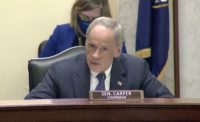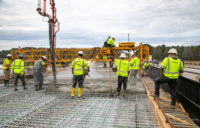After a lengthy debate that stretched far into the night, the House Transportation and Infrastructure Committee has approved a five-year, $547-billion surface transportation measure that also features provisions aimed at curbing carbon emissions in the transportation sector.
The T&I Committee cleared the bill, the Investing in a New Vision for the Environment and Surface Transportation (INVEST) in America Act, early in the morning of June 10, on a 38-26 vote. Just two Republicans voted for the legislation, joining 36 Democrats.
[View committee summary of the bill here, section-by-section breakdown here and bill text here.]
Committee Chair Peter DeFazio (D-Ore.) noted some transportation infrastructure dates from the time of the Eisenhower administration. "It's worn out," DeFazio said. "It needs to be replaced, rebuilt, modernized."
But he also said the committee bill would be "transformative," not just a continuation of the status quo. DeFazio said one aim of the legislation is to deal with climate change, which he called the "existential threat" of the 21st Century.
But the committee's top Republican, Sam Graves of Missouri, recalled last year's transportation bill, also drafted by Democrats. That bill cleared the House but went no further. Graves said the new bill moves even further away from GOP positions. He called it "My Way or the Highway—Part Two."
Highway, Transit, Rail Funds
The measure’s largest allocation is $343 billion for highway and bridge construction and highway safety. The highway-bridge-safety funding would be a 54% increase over current levels, according to Democrats.
The $343 billion includes $8.3 billion for carbon-reduction steps and $6.2 billion for “mitigation and resiliency improvements,” according to a committee summary of the bill.
Transit would receive $109 billion, which Democrats say is a record sum.
In addition, the legislation would provide $95 billion for passenger and freight rail, including $32 billion for Amtrak, triple the railroad’s current funding.
The next step for the measure is a vote on the House floor.
Industry Reactions
"The bill provides a vital increase in funding levels to address project backlogs, ensures much-needed stability and gives added attention to safety, the impacts of climate change and resiliency," said American Society of Civil Engineers President Jean-Louis Briaud in a statement.
Former U.S. Transportation Secretary Ray LaHood said in a statement, “While it would have been preferable for the bill to be crafted and approved by both Democrats and Republicans, INVEST does represent significant investment in America’s surface transportation infrastructure.”
LaHood, also a former Republican U.S. House member, pointed particularly to the measure's funding boost for freight and passenger rail and a provision to establish a test program for mileage-based user fees, which some see as a way to supplement or perhaps replace the federal motor-fuels taxes. LaHood now is co-chair of advocacy group Building America's Future.
Michele Stanley, National Stone, Sand & Gravel Association vice president of government and regulatory affairs, noted the bill's $32 billion for bridge repair and reconstruction and its additional $14.7 billion above the fiscal 2021 enacted levels to help state departments of transportation cover revenue shortfalls they have experienced during the pandemic.
There has been action on surface transportation legislation in the Senate, too. The Senate Environment and Public Works Committee on May 26 unanimously approved a $312.4-billion highway-bridge reauthorization, an increase of more than 30% over the amounts in the last multi-year highway bill, enacted in 2015.
[View ENR 5/26/2021 story on Senate committee bill here.]
Other Senate committees have jurisdiction over transit, highway safety and revenue.
David Bauer, American Road & Transportation Builders Association president and chief executive officer, said in a statement after the House committee’s vote, “Signs of progress toward passage of a multi-year federal transportation investment package are undeniable.”
But Bauer pointed out that the current transportation measure is due to expire on Sept. 30. "Time is short," he said.






